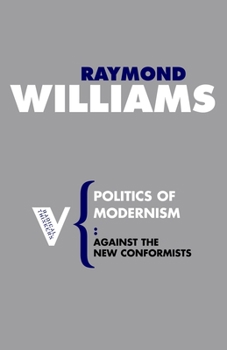Politics of Modernism: Against the New Conformists
(Book #23 in the Radical Thinkers Series)
Select Format
Select Condition 
Book Overview
Considered to be the founding father of British cultural theory, Williams was concerned throughout his life to apply a materialist and socialist analysis to all forms of culture, defined generously and inclusively as "structures of feeling." In this major work, Williams applies himself to the problem of modernism. Rejecting stereotypes and simplifications, he is especially preoccupied with the ambivalent relationship between revolutionary socialist politics and the artistic avant-garde. Judiciously assessing the strengths and weaknesses of the modernist project, Williams shifts the framework of discussion from merely formal analysis of artistic techniques to one which grounds these cultural expressions in particular social formations. Animating the whole book is the question which Williams poses and brings us significantly closer to answering: namely, what does it mean to develop a cultural analysis that goes "beyond the modern" and yet avoids the trap of postmodernism's "new conformism"?
Format:Paperback
Language:English
ISBN:1844675807
ISBN13:9781844675807
Release Date:January 2007
Publisher:Verso
Length:220 Pages
Weight:0.55 lbs.
Dimensions:0.7" x 5.2" x 7.8"
Customer Reviews
1 rating
It's not the politics you're thinking of
Published by Thriftbooks.com User , 14 years ago
The Politics of Modernism is a fantastic look at the way that political climates inform artistic movements. It's got a very specific Marxist bent to it, but the idea that art is not something we make up out of the air is compelling. He argues that in every generation the bourgeois produce unique, distinctively bourgeois dissidents. Modernism wasn't just an artistic movement, it came also from calls for women's rights, anti-imperialism, etc. I was shocked to read his assessment of the present economic crisis: "Managed affluence has slid into an anxiously managed by perhaps unmanageable depression. Some political consensus underlying it has been visibly breaking down, and especially at the level of everyday life [...] the dominant messages are of danger and conflict, and that the dominant forms are of shock and loss [....] Yet these rhythms are familiar to history. They can be traced, with some accuracy, to a dying social order and a dying class" (96). Except that this was written in 1972, which proves that these things are cyclical, despite their appearance of being unique every time. I have to confess at this point that I am, in fact, a literary Marxist a lot of the time, but after reading Williams' manifesto you'll probably find that you are too.





